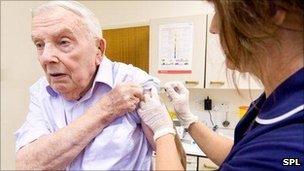Morning flu jabs 'work better for men'
- Published

Men fare better if they are vaccinated in the morning, say the researchers
Flu jabs can be made more effective by changing the time of day they are given - mornings for men and afternoons for women are best - scientists believe.
Synchronising the jab with the body's natural daily cyclical rhythm makes it more likely to offer good immunity, says the University of Birmingham team.
The immune system gets sluggish as we age which explains why only a third of elderly people vaccinated get full protection from their winter flu vaccine.
Rescheduling appointments may help.
To test their theory, the researchers are using GP patients in Birmingham as guinea pigs.
Three hundred of them will be given morning or afternoon vaccination appointments, determined by their gender.
Dr Anna Phillips, who is leading the research, said: "The biggest effect we found was that men had a much stronger antibody response when they had the flu jab in the morning, meaning they would be better protected against flu
"The reason behind this is likely to be due to an interaction between the hormones and immune system messengers that fluctuate throughout the day, and sex hormones. We are now testing several potential candidates to try to understand this effect better.
"If this works, it would be such an easy intervention to improve protection against infection in older adults."
Dr Phillips and her team hope to get a definitive answer by studying at least 300 elderly patients attending for their routine flu vaccinations this winter and next.
"We've already made a start and hope to get enough patients on board to be able to see if such a simple, cheap measure of changing appointment times can make all the difference."
Professor Janet Lord, external, an expert in on healthy ageing, external, said: "It's a major health issue trying to find ways to improve the vaccination response.
"We know that immunity goes down with ageing. But this work may have found a way to counter that."
The Medical Research Council has made more funding available to continue the work.
- Published22 September 2011
- Published6 September 2011